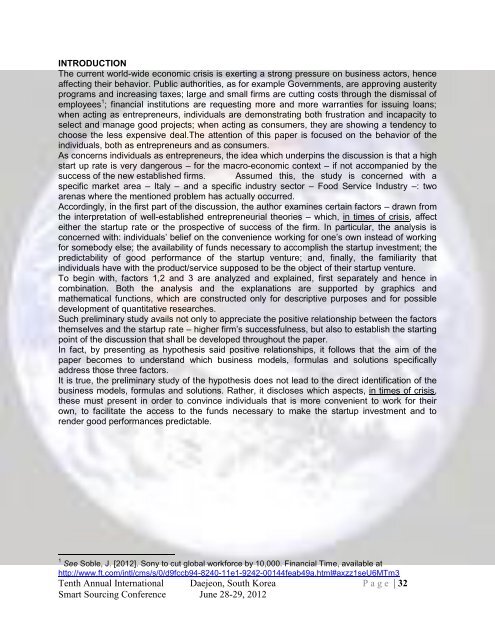of 3 - Center for Global Outsourcings
of 3 - Center for Global Outsourcings
of 3 - Center for Global Outsourcings
You also want an ePaper? Increase the reach of your titles
YUMPU automatically turns print PDFs into web optimized ePapers that Google loves.
INTRODUCTION<br />
The current world-wide economic crisis is exerting a strong pressure on business actors, hence<br />
affecting their behavior. Public authorities, as <strong>for</strong> example Governments, are approving austerity<br />
programs and increasing taxes; large and small firms are cutting costs through the dismissal <strong>of</strong><br />
employees 1 ; financial institutions are requesting more and more warranties <strong>for</strong> issuing loans;<br />
when acting as entrepreneurs, individuals are demonstrating both frustration and incapacity to<br />
select and manage good projects; when acting as consumers, they are showing a tendency to<br />
choose the less expensive deal.The attention <strong>of</strong> this paper is focused on the behavior <strong>of</strong> the<br />
individuals, both as entrepreneurs and as consumers.<br />
As concerns individuals as entrepreneurs, the idea which underpins the discussion is that a high<br />
start up rate is very dangerous – <strong>for</strong> the macro-economic context – if not accompanied by the<br />
success <strong>of</strong> the new established firms. Assumed this, the study is concerned with a<br />
specific market area – Italy – and a specific industry sector – Food Service Industry –: two<br />
arenas where the mentioned problem has actually occurred.<br />
Accordingly, in the first part <strong>of</strong> the discussion, the author examines certain factors – drawn from<br />
the interpretation <strong>of</strong> well-established entrepreneurial theories – which, in times <strong>of</strong> crisis, affect<br />
either the startup rate or the prospective <strong>of</strong> success <strong>of</strong> the firm. In particular, the analysis is<br />
concerned with: individuals’ belief on the convenience working <strong>for</strong> one’s own instead <strong>of</strong> working<br />
<strong>for</strong> somebody else; the availability <strong>of</strong> funds necessary to accomplish the startup investment; the<br />
predictability <strong>of</strong> good per<strong>for</strong>mance <strong>of</strong> the startup venture; and, finally, the familiarity that<br />
individuals have with the product/service supposed to be the object <strong>of</strong> their startup venture.<br />
To begin with, factors 1,2 and 3 are analyzed and explained, first separately and hence in<br />
combination. Both the analysis and the explanations are supported by graphics and<br />
mathematical functions, which are constructed only <strong>for</strong> descriptive purposes and <strong>for</strong> possible<br />
development <strong>of</strong> quantitative researches.<br />
Such preliminary study avails not only to appreciate the positive relationship between the factors<br />
themselves and the startup rate – higher firm’s successfulness, but also to establish the starting<br />
point <strong>of</strong> the discussion that shall be developed throughout the paper.<br />
In fact, by presenting as hypothesis said positive relationships, it follows that the aim <strong>of</strong> the<br />
paper becomes to understand which business models, <strong>for</strong>mulas and solutions specifically<br />
address those three factors.<br />
It is true, the preliminary study <strong>of</strong> the hypothesis does not lead to the direct identification <strong>of</strong> the<br />
business models, <strong>for</strong>mulas and solutions. Rather, it discloses which aspects, in times <strong>of</strong> crisis,<br />
these must present in order to convince individuals that is more convenient to work <strong>for</strong> their<br />
own, to facilitate the access to the funds necessary to make the startup investment and to<br />
render good per<strong>for</strong>mances predictable.<br />
1<br />
See Soble, J. [2012]. Sony to cut global work<strong>for</strong>ce by 10,000. Financial Time, available at<br />
http://www.ft.com/intl/cms/s/0/d9fccb94-8240-11e1-9242-00144feab49a.html#axzz1seU6MTm3<br />
Tenth Annual International Daejeon, South Korea P a g e | 32<br />
Smart Sourcing Conference June 28-29, 2012



